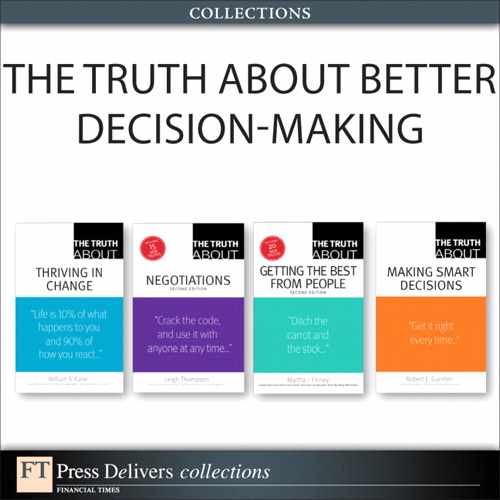Truth 7. To make better decisions, make more mistakes
This may seem counterintuitive because you might think you would get better at making decisions by avoiding mistakes. Not so.
In 1953, James Burke's career at Johnson & Johnson almost ended before it began. Shortly after arriving at the company, he was product director for several over-the-counter medicines for children. All of them were failures—multimillion dollar failures. He was called into the chairman's office, fully expecting to be fired. Instead, General Johnson told him that business is about making decisions. You don't make decisions without making mistakes. Just don't make the same mistake twice. And besides, the company had just invested millions of dollars in Burke's education. They were not about to let him go.
When have you learned the most in your career? Probably when you've made mistakes. One good mistake can teach us more than all the successful decisions combined. The trouble is that as we become older and more experienced, we take pride in the fact that we make fewer mistakes. We're good at what we do, and that means not screwing up, right? When we're toddlers, we trip and fall all the time. People think it's cute. When we grow up and stumble, it's not cute. We're punished, fired, and embarrassed. We become the butt of jokes, like President Gerald Ford ridiculed with stumbling pratfalls by comedian Chevy Chase. Mistakes hurt. The problem is that the fewer mistakes we make, the less we learn.
A less-talented leader than General Johnson might have fired Burke on the spot. By allowing Burke to make this huge mistake, Johnson advanced the career of an executive who would become one of J&J's greatest leaders and one of the most respected and courageous CEOs, named by Fortune as one of the "10 Greatest CEOs of All Time." General Johnson also helped create a culture that allowed for making mistakes. This was a lesson Burke never forgot. In 1982, he faced a crisis when seven people died in Chicago from Tylenol that had been laced with cyanide. It could have meant the end of the Tylenol brand, the country's best-selling over-the-counter pain reliever, or even the end of the company. Burke took a huge risk in recalling and repackaging millions of bottles of Tylenol. At the time, it was a controversial decision to put the company's ethics above profits. The out-of-pocket costs of the recall were immediate, and the returns were not at all certain. But Burke had spent his entire career making courageous decisions based on principle.
To make better decisions, you need to make mistakes. You also need to allow others to make mistakes. Do it in areas that are less visible and less risky. Don't bet your whole career or whole business (unless absolutely necessary). Don't drive your car over a cliff. Make mistakes, and visibly reward others who failed for the right reasons or succeeded by challenging a deeply held assumption that proved false. Ask yourself: How can you make more mistakes? Design experiments to test hypotheses (those you expect to work out) and then look for ways to take unexpected actions that you think may fail. You may be surprised by some unexpected successes that will change the way you look at your future decisions.
